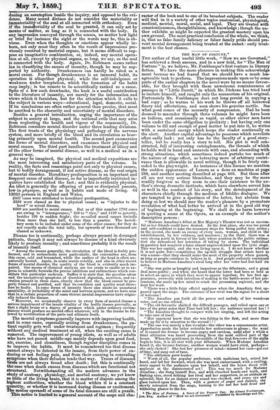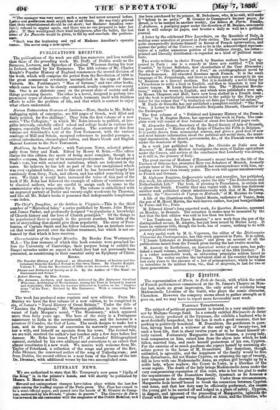THE MAN OF FORTUNE. * THE author of that useful little
work, " How we are Governed," has achieved a fresh success, and in a new field, for " The Man of Fortune " is, we believe, Mr. Fonblanque's first venture in literary fiction. We have the more pleasure in making this acknowledge ment because we had feared that we should have a much lee- agreeable task to perform. The impressions made upon us by some parts of the earlier chapters in the novel were by no means favour- able, for they brought with them unwelcome reminiscences of passages in " Little Dorrit," in which Mr. Dickens has tried hard to imitate himself, and caught only the mannerism of his original. Fortunately Mr. Fonblanque does not long persist in copying a bad copy ; as he warms to his work he throws off all borrowed finery and affectations, and soon shows his genuine mettle. See what good comes of the necessity of compression. Had he been doomed to maunder through three volumes he might have been as tedious, and occasionally as vapid, as other clever men have been under the same obligation to prolixity ; but having only one volume to fill and enough of good matter to put into it, he writes with a sustained energy which keeps the reader continually on the alert. Another capital advantage he possesses which novelists often sadly lack ; not only has he the faculty of a good story- teller, but he really has a story to tell. His plot is well con- structed, full of interesting entanglements, the threads of which he holds well in hand and unravels with ease, and abounding with strong situations, which sometimes indeed partake too much of the nature of stage effect, as betraying more of arbitrary contri- vance than is allowable in novel writing, though it be freely con- ceded to the playwright. As instances of this license we mention the sudden appearance of Lenora as a dens ex machine at page 288, and another meeting described at page 403. But these after all are not very serious blemishes, and they may be the more readily forgiven as they seem to owe their existence to the au- thor's strong dramatic instincts, which have elsewhere served him so well in the conduct of his story, and the development of its characters chiefly. through the medium of lifelike dialogue. We are tempted to give a specimen of the latter, but abstain from doing so lest we should mar the reader's pleasure by a premature revelation of what had better be arrived at in the good old way of beginning at the beginning. We shall do no harm however in quoting a scene at the Opera, as an example of the author's descriptive powers : "Madame Amadina's debut at Her Majesty's Theatre was not as success- ful as her friends could have desired. In the first place, she was too proud and self-confident to take the necessary steps for being puffed into notice ; in the second, she made an enemy of every man, woman, and child in the establishment, by her coldness, and insolence; in the third, there was a
i
very strong party in favour of the lady whose position in the_public estima- tion she announced her intention of taking by storm. The individual in question had acquired a fame almost unprecedented upon the lyric stage. This was her capital, and she was living upon it. I do not know whether it is not quite fair—considering the up-hill struggle that artists have to win a name—that they should make the most of the property when gained, as long as people continue to believe in it. And people certainly continued to believe in Madame Amadina's rival long after her voice had lost half its notes.
"She was quite as haughty and imperious as the debutante, and a gnat deal more politic ; and when she heard that the latter had been so bold as to select an opera in which they were to appear together, for her first ap- pearance, avowedly with intention of making it the battle-scene of her pre- tensions, she made up her mind to crush the presuming aspirant, and she kept her word.
" There was a little faint official applause when the Amadinia first ap- peared upon the stage. The entrance of her rival was the signal for a shout of welcome !
" The Amadina put forth all the power and melody of her wondrous voice, and no one stirred. "The old favourite shirked the difficult passages, and relied upon one or two of the great notes that Time had left her ; the audience encored her ! I "The Amadina thought to conquer with her singing, and left the acting to take care of itself.
"Her opponent knew that she was failing in the first, and more than made up for it by attention to the second ! ! ! " The one was merely a fine vocalist—the other was a consummate neje. Approbation made the latter redouble her endeavours to please ; the want of it caused the former to become angry and careless, until after a while a faint sibilation was heard proceeding from the most critical part of the house. When the gentlemen in themiddle of the first five rows of the stalls begin to hiss, it is all over with your debutante. When Madame Amadina heard it, she became furious; another woman would have cried, perhaps— she only choked ! She lost her presence of mind—missed her cues—got out of time, and sang out of tune.
"The sibilation grew louder. " Worst of all the popular performer, with malicious tact, seized her hand, and led her forward, when she was most embarrassed, with a smiling,
mute appeal to the audience upon her behalf, and the house shook with applause at the disinterested act ! This was too much for Madame Amadina ; she flung herself free,. and with clenched hands and teeth, and flashing eyes, stood defying her rival and her supporters, in an attitude so splendid, that for an instant every sound was checked, and every eye and glass turned upon her. Then, with a gesture of anger and disdain, end withering retreated from the stage, turning to the last her bold front withering glance to the foe.
• 134e Man of Fortune. A Wry
of the Present Day. By A y F onblan
PB. Esq. Author of " How we are Governed." Fatalities, by Houtiedrt addint, 4;0•
lban
-4 manager was very sorry; such a scene had never oceurred before. Lrdies and gentlemen must acquit him of all blame. He was truly grieved that their entertainment should be cut short ; but Madame Amadma reso- lutely refused to appear again, and there was no one prepared to take her plat:. If they would grant their kind indulgence, after the ballet, the last scene of La Iavorita would be given, to fill np and conclude the perform- ante.
"faith was the beginning and end of Madame Amadina's operatic career. She never sang a note again."



























 Previous page
Previous page